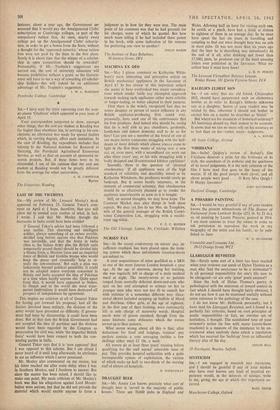LAST OF THE VICEROYS Sia,—My review of Mr. Leonard Mosley's
book appeared on February 23, General Tuker's com- ment on April 6; I hope, therefore, that you will allow me to remind your readers of what, in fact, I wrote. I said that Mr. Mosley thought the massacres in India could have been avoided if General Tuker's advice had been followed a year earlier. This charming and intelligent
soldier, always something of an enfant terrible,
decided long before anyone else that Pakistan was inevitable, and that the Army in India (that is, the Indian Army plus the British units temporarily posted there) should be divided into a Hindu force, a Moslem force and an impartial force of British and Gurkha troops who would keep the peace and eventually 'help to re- unify the sub-continent.' But such a plan was ludicrously beyond political possibility. It could not be adopted unless everyone concerned in Britain and India accepted the idea of Pakistan at a time when hardly anyone did. Quite apart from that, it would have appeared to Nehru, to Jinnah and to the world the most trans- parent imperialism; it would have destroyed all prospect of independence by agreement.
This implies no criticism at all of General Tuker for having put forward his proposal; had all the
factors involved been military, the division of the
army would have presented no difficulty. If govern- ment had been by dictatorship, it could have been done. But at that date the British Government had not accepted the idea of partition and the division would have been regarded by the Congress as preparation for civil war, while 'the impartial British force' would have been suspect to both the con- tending parties in India.
General Tuker says that it is 'now apparent' that I was opposed to this scheme. But I am afraid I never heard of it until long afterwards; he attributes to me an influence which I never possessed.
Mr. Mosley also commented on my review, but his letter reached me after some delay when I was in Southern Mexico, and I forebore to answer. But since the matter has been raised, I should like to make one point. My main criticism of Mr. Mosley's
book was that his allegations against Lord Mount- batten were serious, but that he did not provide the material which would enable anyone to form a
judgment as fo how far they were true. The main point of his comment was that he had grounds for his charges, some of which he quoted. But how much more telling if he had included these points in his book, with some indication of his reasons for preferring one view to another!
The Institute of Race Relations, 36 Jertnyn Street, SWI
PHILIP MASON


































 Previous page
Previous page